The Ultimate Guide to Samoyed Dogs
Introduction to Samoyed Dogs
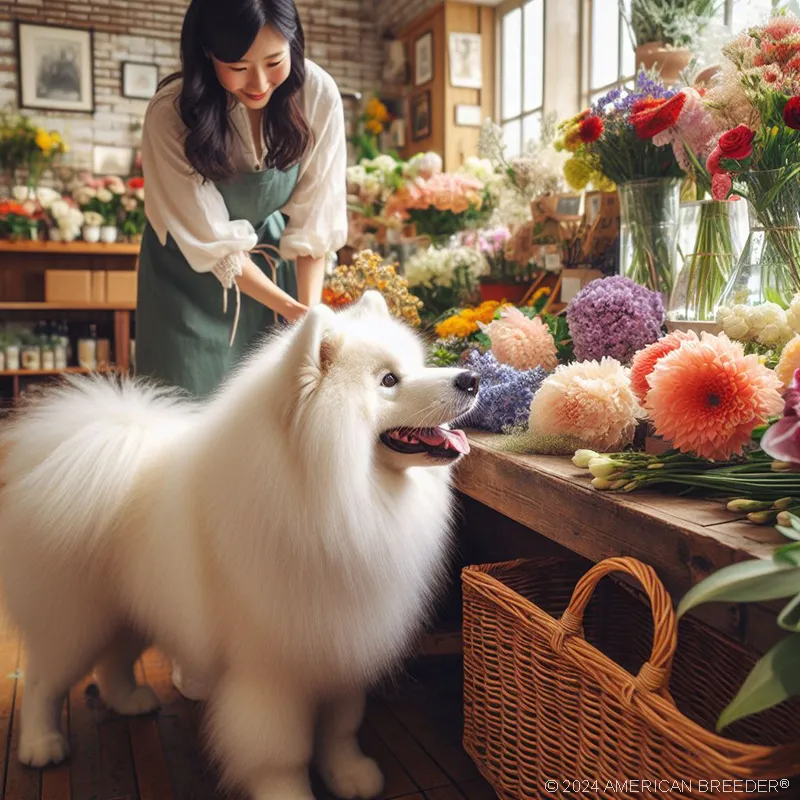 Welcome to the captivating world of Samoyed dogs, where fluffy elegance meets boundless charm. These delightful canines have carved a special place in the hearts of dog lovers worldwide, offering a blend of striking appearance, endearing personality, and historical significance. In this comprehensive guide, we'll embark on a journey that explores every facet of the Samoyed breed, from their origins and characteristics to their care, training, and the profound bond they form with their human companions.
Welcome to the captivating world of Samoyed dogs, where fluffy elegance meets boundless charm. These delightful canines have carved a special place in the hearts of dog lovers worldwide, offering a blend of striking appearance, endearing personality, and historical significance. In this comprehensive guide, we'll embark on a journey that explores every facet of the Samoyed breed, from their origins and characteristics to their care, training, and the profound bond they form with their human companions.
Unveiling Samoyed Breed Background
Origins and Development of Samoyed Dogs
Originating from the Siberian regions, Samoyeds have a rich history intertwined with the nomadic Samoyed people. These remarkable dogs played a pivotal role in the daily lives of the Samoyed tribes, serving as herders, sled pullers, and even warm companions during frigid nights. Their ancestral connection to these indigenous peoples is a testament to their versatility and adaptability.
Historical Significance and Cultural Relevance
Samoyeds' historical significance extends beyond their utilitarian roles. They accompanied explorers in Arctic expeditions, contributing to scientific research and enduring harsh conditions with unwavering loyalty. The bond formed between Samoyeds and humans during these expeditions solidified their reputation as reliable and affectionate companions.
Purpose and Original Use of Samoyed Dogs
In their early days, Samoyeds were essential for the survival of the Samoyed people. They herded reindeer, protected the camp, and provided much-needed warmth during freezing nights. Today, while they no longer pull sleds or herd reindeer, Samoyeds maintain their original purpose of companionship, bringing joy, love, and laughter to modern families.
Kennel Clubs and Recognition
Samoyeds gained recognition by various kennel clubs, with the American Kennel Club (AKC) officially recognizing them in the early 20th century. Their inclusion in the Working Group classification acknowledges their historical roles as working dogs. The breed's journey from the Arctic tundra to modern homes showcases their enduring appeal and adaptability.
Unraveling the Appearance of Samoyed Dogs
 Size, Weight, and Physical Activity
Size, Weight, and Physical Activity
Samoyeds are medium to large dogs, exuding an air of elegance and strength. Males typically stand between 21 and 23.5 inches at the shoulder, while females range from 19 to 21 inches. Weight varies between 50 to 65 pounds for males and 35 to 50 pounds for females. Their robust build, coupled with a graceful gait, is a testament to their history as working dogs.
Coat Type, Color Variations, and Patterns
One of the most captivating features of Samoyeds is their luxurious double coat. The outer coat is straight and harsh, while the undercoat is soft and dense, offering insulation against harsh climates. Their distinctive white coat is a hallmark of the breed, although slight cream tinges are acceptable. The coat's pure white hue not only adds to their regal appearance but also reflects their Arctic heritage.
Distinctive Features and Markings
Samoyeds possess several distinctive features that set them apart. Their eyes, often described as "Sammy smiles," have an almond shape and a friendly expression. Dark, intelligent eyes radiate warmth and curiosity. Additionally, their erect triangular ears add to their attentive appearance, showcasing their keen awareness of their surroundings.
Average Litter Size
Samoyed litters typically consist of 5 to 6 puppies. The birth of these adorable bundles of fur marks the continuation of the breed's legacy and the potential for future generations to bring joy to households around the world.
Exploring Samoyed Temperament and Personality
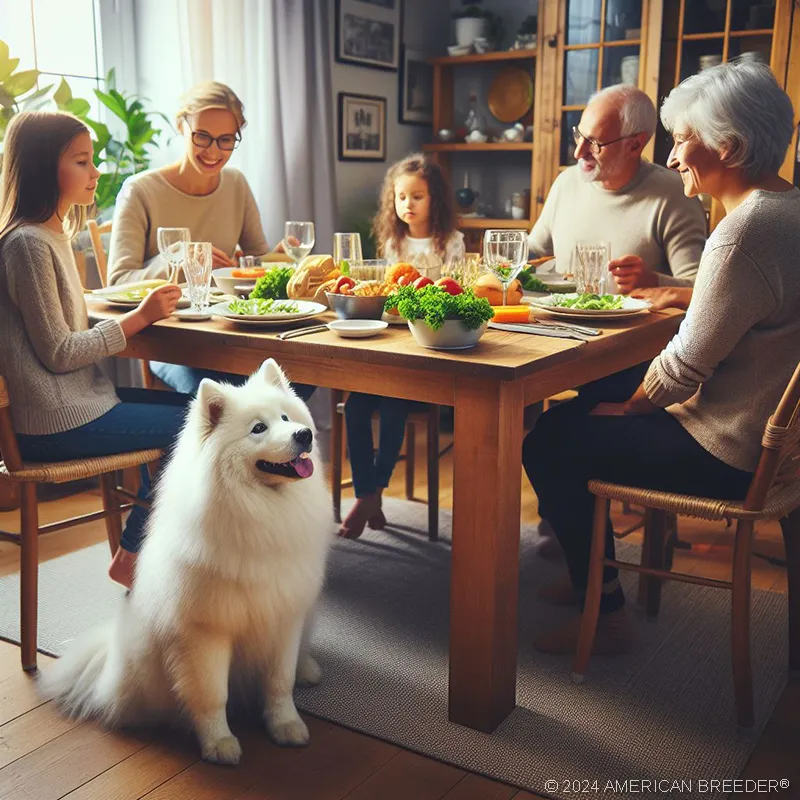 Typical Temperament Traits and Behavior Tendencies
Typical Temperament Traits and Behavior Tendencies
Samoyeds are renowned for their gentle and friendly temperament. They are known to be affectionate, loyal, and dedicated to their families. Their social nature makes them great companions for families, singles, and seniors alike. Their history of working closely with people has instilled in them a strong bond and a desire to be an integral part of family activities.
Energy Levels and Activity Requirements
While Samoyeds have a moderate energy level, their active nature necessitates regular exercise to keep them happy and healthy. Engaging in daily walks, play sessions, and mentally stimulating activities satisfies their need for physical and mental stimulation, preventing boredom-induced behaviors.
Compatibility with Different Lifestyles and Family Dynamics
One of the remarkable aspects of Samoyeds is their versatility when it comes to fitting into various lifestyles. They thrive in households with families, singles, or seniors, adapting to the energy levels and routines of their human companions. Their sociable nature makes them excellent playmates for children and patient companions for seniors.
List of Typical Behavior Issues
While Samoyeds are known for their amiable personalities, like any breed, they can exhibit certain behavior issues. These may include tendencies towards excessive barking, digging, and separation anxiety. Addressing these challenges through positive reinforcement training and consistent guidance helps ensure a well-behaved and contented Samoyed.
Samoyeds' temperament is a harmonious blend of friendliness, loyalty, and playfulness. Their ability to adapt to various lifestyles and their strong bonds with humans make them cherished members of households around the globe.
Nurturing Samoyed Trainability and Intelligence
Trainability Level and Ease of Learning
Samoyeds boast a high level of trainability, owing to their intelligence and eagerness to please. They quickly pick up on commands and routines, making training sessions enjoyable for both owner and dog. Their responsiveness to positive reinforcement methods fosters a strong connection and a rewarding training experience.
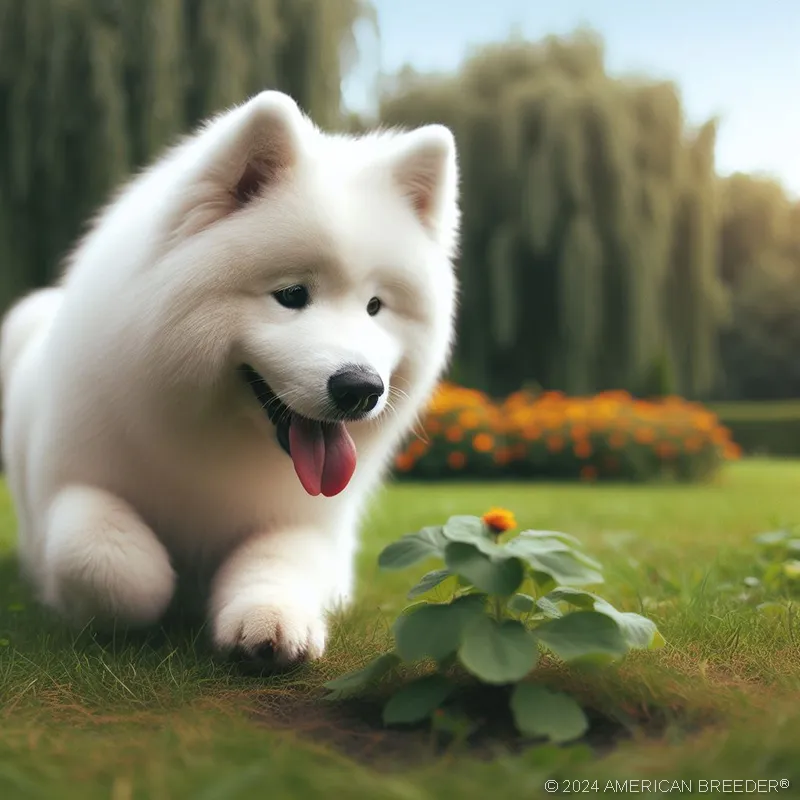 Willingness to Please Their Owner
Willingness to Please Their Owner
Samoyeds are known for their desire to please their owners, making them highly motivated during training sessions. This willingness to learn and perform commands stems from their history as working dogs that played vital roles in the lives of their human companions. This cooperative nature enhances the training process and facilitates effective communication between the dog and its owner.
Intelligence and Problem-Solving Abilities
Ranked among the more intelligent breeds, Samoyeds possess the ability to solve problems and adapt to new situations. Their sharp minds and natural curiosity make them adept at learning new tasks and navigating various environments. Engaging them in mentally stimulating activities, such as puzzle toys and interactive games, harnesses their cognitive abilities and keeps their minds sharp.
Recommended Training Approaches and Techniques
Positive reinforcement training methods are particularly effective for Samoyeds. Rewarding desired behaviors with treats, praise, and playtime reinforces their understanding of commands and encourages them to repeat those behaviors. Consistency and patience are key, as Samoyeds thrive on clear communication and positive interactions.
Training or Skills Suited for Samoyed Dogs
Samoyeds excel in a variety of training areas, thanks to their intelligence and versatility. Basic obedience commands, such as sit, stay, and come, are easily learned. Furthermore, Samoyeds can participate in advanced training activities, agility courses, and even therapy work. Their adaptable nature allows them to embrace new challenges and contribute positively to various roles.
Cultivating your Samoyed's intelligence through training not only strengthens your bond but also empowers them to lead fulfilling lives as active, engaged companions.
Practical Considerations for Samoyed Ownership
Size of Sleeping Quarters Depending on Size
Creating a comfortable sleeping area for your Samoyed is crucial. A spacious dog bed or crate that accommodates their size provides a cozy retreat where they can rest peacefully. Providing a designated sleeping space reinforces their sense of security and belonging within your home.
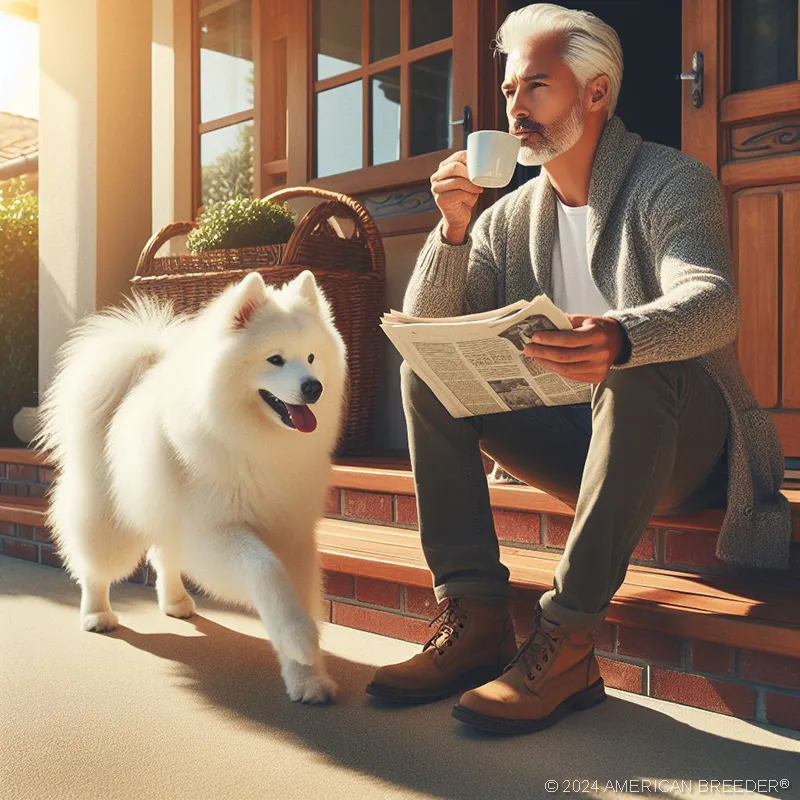 Typical Annual Veterinary Cost
Typical Annual Veterinary Cost
Ensuring your Samoyed's health and well-being involves regular veterinary check-ups, vaccinations, and preventive care. Anticipating annual veterinary costs helps you budget for their medical needs, guaranteeing their overall health and longevity.
Type of Grooming and Annual Cost
Samoyeds' luxurious double coat requires regular grooming to prevent matting and maintain its natural beauty. Brushing their coat a few times a week, along with occasional baths and nail trimming, promotes healthy skin and fur. Grooming costs may include brushes, shampoos, and professional grooming services.
Daily Exercise Needs and Requirements
Samoyeds thrive on daily exercise and mental stimulation. Engaging in walks, play sessions, and interactive games not only keeps them physically fit but also nurtures their mental well-being. Meeting their exercise requirements contributes to a happy, well-adjusted Samoyed.
Level of Playfulness
Samoyeds' playful nature endears them to people of all ages. Their love for games, fetching, and interacting with their human companions fosters joyous moments and strengthens the bond between owner and dog. Embracing their playful spirit enriches their lives and brings laughter to your home.
Level of Intelligence
Samoyeds' high intelligence level necessitates mental engagement. Providing puzzles, interactive toys, and training sessions challenges their minds and prevents boredom-related behaviors. Stimulating their intellect contributes to their overall happiness and ensures a well-rounded canine companion.
 Affection Level and Desired Attention
Affection Level and Desired Attention
Samoyeds are known for their affectionate nature and desire for companionship. They thrive on human interaction and enjoy being part of family activities. Offering them affection, attention, and quality time enhances their emotional well-being and reinforces the strong bond you share.
Friendliness Toward Strangers
Samoyeds' friendly and sociable demeanor often extends to strangers. Their approachable nature makes them great ambassadors of their breed, welcoming new acquaintances with a warm and gentle attitude. This affable disposition enriches social interactions and makes them beloved members of communities.
Grooming Needs and Frequency
Grooming is a significant aspect of Samoyed care due to their luxurious coat. Brushing their coat a few times a week prevents matting and distributes natural oils, promoting a healthy and glossy appearance. Regular grooming sessions also provide opportunities for bonding and positive experiences.
Feeding Requirements and Dietary Considerations
Samoyeds' dietary needs should align with their age, size, activity level, and overall health. Portion sizes and feeding schedules vary based on individual requirements. Providing high-quality dog food that meets their nutritional needs, along with occasional treats, ensures their well-being.
Signs of Potential Health Problems and When to Seek Veterinary Attention
Staying attuned to your Samoyed's health is paramount. Being vigilant for signs of potential health issues, such as changes in appetite, energy levels, or behavior, enables early detection and timely intervention. Consulting a veterinarian when abnormalities arise ensures your Samoyed receives proper care and treatment.
Samoyed ownership involves understanding their practical needs, maintaining their health and appearance, and nurturing their physical and emotional well-being. Meeting these considerations guarantees a happy and fulfilling life for your Samoyed.
Socialization and Compatibility
Interaction with Children, Other Pets, and Strangers
Samoyeds' gentle and amiable nature makes them excellent companions for households with children and other pets. Their patient demeanor and playful spirit allow them to form close bonds with children, ensuring joyful playtimes and lasting friendships. Similarly, their sociability extends to other animals, fostering harmonious relationships within multi-pet households.
 Socialization Needs and Tips for Proper Socialization
Socialization Needs and Tips for Proper Socialization
Early and ongoing socialization is crucial for Samoyeds. Introducing them to various people, environments, and situations during their formative months helps build their confidence and ensures they become well-adjusted adults. Positive interactions and exposure to different stimuli create a foundation of resilience and adaptability.
Precautions or Considerations for Multi-Dog Households
While Samoyeds generally get along well with other dogs, each individual's temperament should be considered. Proper introductions, positive interactions, and monitoring playtime dynamics promote a harmonious multi-dog household. Creating a balanced environment that respects each dog's space and needs fosters positive relationships.
Level of Ease When It Comes to Training Samoyed Dogs
Samoyeds' intelligence and eagerness to please make them relatively easy to train. Their affinity for learning and positive reinforcement training methods facilitate effective communication and cooperation. However, consistent and patient training is essential to harness their potential and ensure successful outcomes.
Playtime and Exercise with Other Dogs or Pets
Samoyeds' sociable nature extends to their interactions with other dogs and pets. Engaging in playtime with fellow canines fosters healthy socialization and provides an outlet for their energy. Monitoring play to ensure positive interactions and promoting safe play environments nurtures their social bonds.
Dog-Friendly Activities and Outings
Samoyeds enjoy a range of dog-friendly activities and outings. Whether it's a trip to the dog park, a hike in nature, or attending canine events, these experiences enhance their socialization and mental stimulation. Engaging in shared adventures deepens the bond between you and your Samoyed.
Living Arrangements and Environment
Suitability for Different Living Arrangements
Samoyeds' adaptable nature makes them suitable for various living arrangements. Whether you live in an apartment, a house, or a rural area, Samoyeds can thrive with proper care and attention to their exercise and socialization needs. Tailoring their living environment to their specific requirements ensures their well-being and happiness.
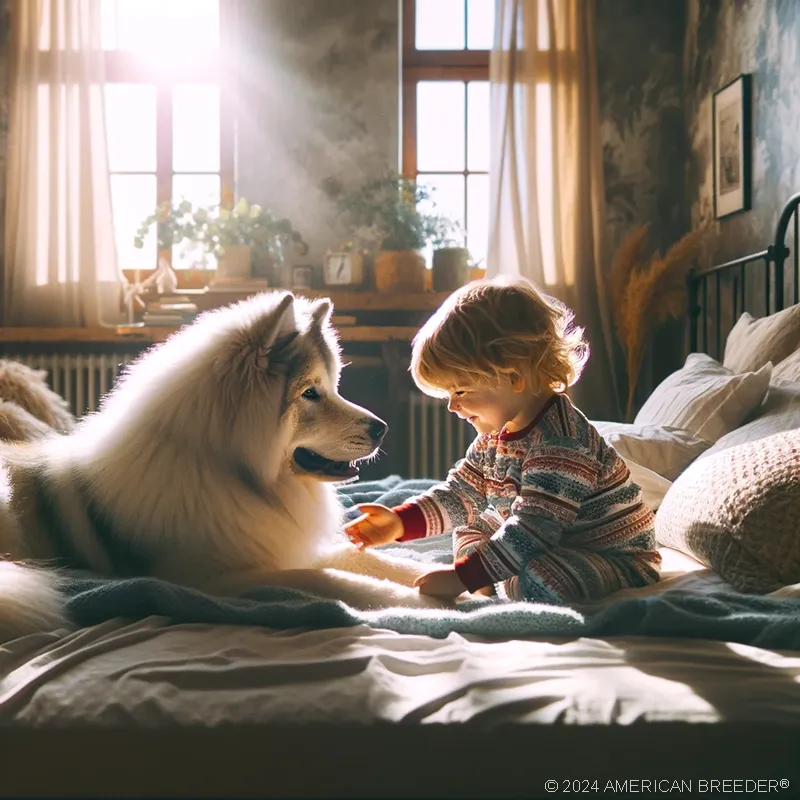 Space Requirements and Exercise Options
Space Requirements and Exercise Options
Samoyeds require adequate space to move and play, making houses with fenced yards particularly appealing. However, apartments can also be suitable if their exercise needs are met through regular walks and play sessions. Providing opportunities for physical activity, mental stimulation, and socialization is essential regardless of living space.
Climate Considerations and Adaptability
Originating from colder climates, Samoyeds are well-equipped to handle cold weather. Their double coat provides insulation, making them more comfortable in cooler temperatures. However, in warmer climates, it's important to provide shade, fresh water, and indoor relief from the heat to ensure their comfort and safety.
Recommended Yard Size for Samoyed Dogs
If you have a yard, providing ample space for your Samoyed to play, explore, and move around is beneficial. A securely fenced yard allows them to engage in off-leash activities safely. Regular exercise in the yard not only fulfills their physical needs but also satisfies their curiosity and sense of adventure.
Ideal Living Conditions and Environment
Creating an ideal living environment for your Samoyed involves a blend of physical, social, and mental stimulation. A loving and active household, combined with access to outdoor spaces and engaging activities, ensures a fulfilling and joyful life for your Samoyed.
Training and Obedience
Basic Obedience Training and Commands
Starting with basic obedience commands, such as sit, stay, come, and leash walking, lays the foundation for a well-behaved Samoyed. Consistency, positive reinforcement, and patience are essential during training sessions. Mastery of these commands enhances your Samoyed's safety, responsiveness, and integration into various settings.
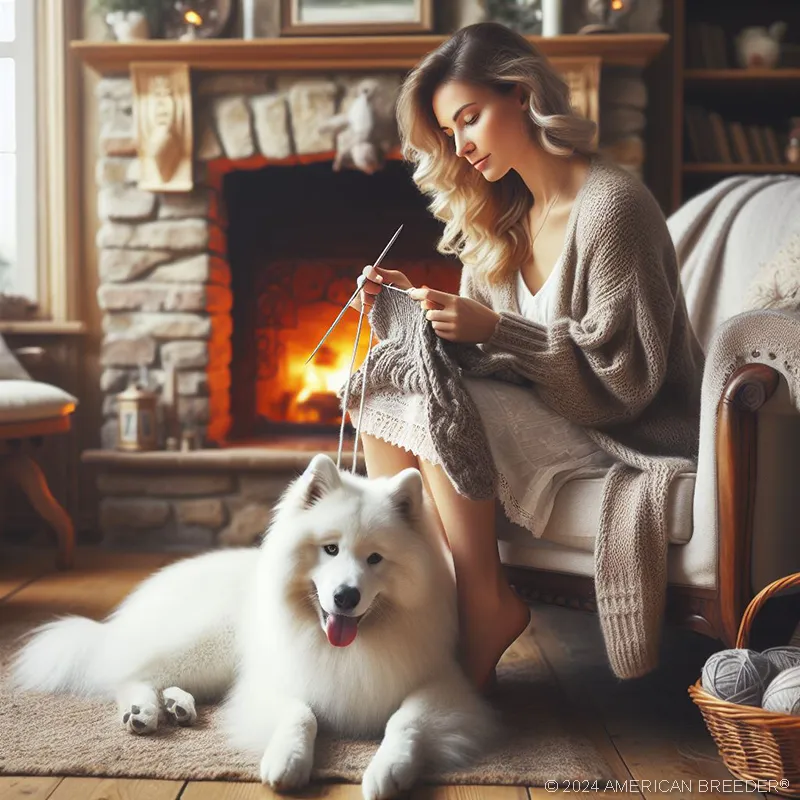 Advanced Training or Specialized Activities Suited for Samoyed Dogs
Advanced Training or Specialized Activities Suited for Samoyed Dogs
Samoyeds' intelligence and versatility make them excellent candidates for advanced training activities. Agility, nose work, and canine sports provide mental and physical challenges that engage their minds and bodies. Engaging in these activities strengthens your bond and taps into their potential for excellence.
Behavioral Challenges or Specific Training Considerations
While Samoyeds are generally cooperative and easy to train, addressing potential behavior challenges ensures a harmonious relationship. Barking, digging, and separation anxiety are common concerns. Training techniques that focus on redirection, positive reinforcement, and gradual desensitization address these challenges effectively.
House Training and Potty Training Tips
House and potty training are fundamental aspects of Samoyed ownership. Consistency, a set routine, and positive reinforcement for desired behaviors are key to successful house training. Taking your Samoyed outside at regular intervals, especially after meals and naps, helps them understand where it's appropriate to eliminate. Celebrating their successes with praise and treats reinforces the desired behavior.
Leash Training and Walking Etiquette
Teaching your Samoyed proper leash manners enhances your walks and outdoor experiences. Begin by introducing them to a collar or harness and leash in a positive manner. Gradually acclimate them to walking on a leash and practice loose leash walking. Positive reinforcement and patience transform walks into enjoyable bonding moments.
Exercise and Activity
Daily Exercise Needs and Recommendations
Samoyeds have moderate to high exercise needs due to their energy levels and active nature. Engaging in daily walks, play sessions, and interactive games not only meets their physical requirements but also prevents boredom-related behaviors. Regular exercise keeps them mentally stimulated and maintains their overall health.
Mental Stimulation Activities and Games
Incorporating mental stimulation activities and games is essential for a content and well-rounded Samoyed. Puzzle toys, hide-and-seek games, and training sessions challenge their minds and prevent restlessness. Providing outlets for mental engagement taps into their intelligence and prevents behavioral issues.
Exercise Routines and Activity Ideas
Variety is key when designing exercise routines for Samoyeds. Combining different activities such as walks, hikes, fetch, and agility training keeps them mentally engaged and physically active. Mixing up their routines prevents monotony and enriches their lives with novel experiences.
Energy Outlets for High-Energy Breeds
High-energy Samoyeds require creative outlets to expend their energy constructively. Engaging in agility courses, canine sports, and outdoor adventures like hiking fulfills their need for physical activity. Satisfying their energy levels ensures they remain content, happy, and well-adjusted companions.
Financial Planning
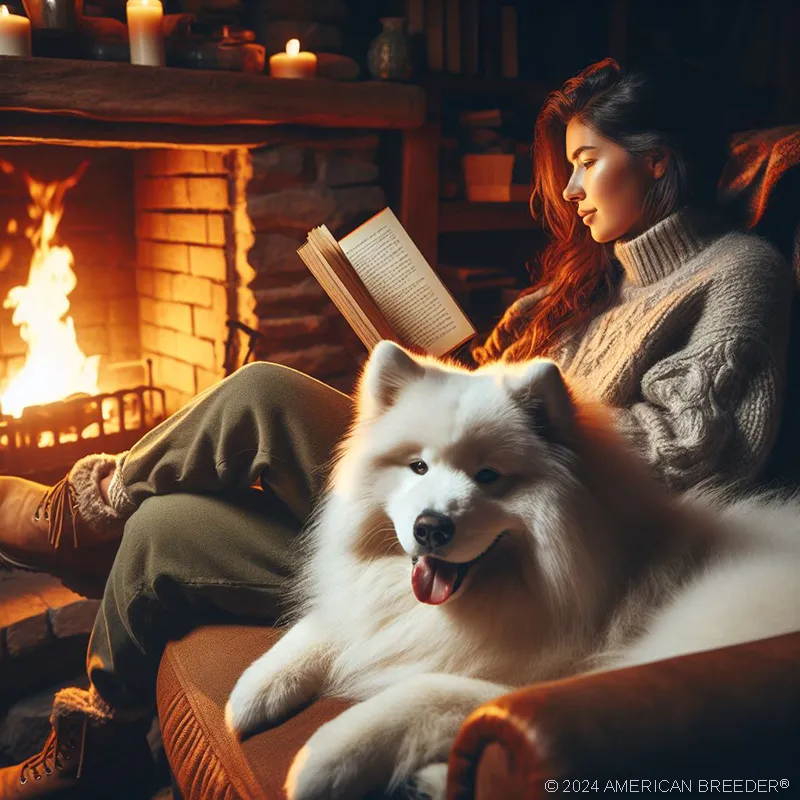 Typical Price Range for Purchasing Samoyed Dogs from Reputable Breeders
Typical Price Range for Purchasing Samoyed Dogs from Reputable Breeders
The cost of purchasing a Samoyed from reputable breeders can vary based on factors such as location, lineage, and breeder reputation. Generally, Samoyeds come with a moderate to high price tag due to their popularity and unique characteristics.
Initial Costs
Initial expenses include adoption or purchase fees, vaccinations, spaying or neutering, and microchipping. Additionally, investing in quality dog supplies such as a bed, crate, collar, leash, and food bowls prepares your home for your new Samoyed's arrival.
Ongoing Expenses
Ongoing expenses encompass food, grooming supplies, regular veterinary care, training, toys, and preventive medications. Budgeting for these costs ensures your Samoyed's health and happiness remain a priority throughout their lifetime.
Considerations for Pet Insurance or Budgeting for Unexpected Medical Costs
Pet insurance can offer financial protection in case of unexpected medical expenses. Budgeting for emergency veterinary care, as well as setting aside funds for routine check-ups and preventive treatments, guarantees your Samoyed receives the necessary care without straining your finances.
Options for Pet Care During Vacations or Travel
Planning for your Samoyed's care during vacations or travel is essential. Options include hiring a pet sitter, enlisting a trusted friend or family member, or arranging a stay at a reputable boarding facility. Ensuring your Samoyed's comfort and well-being during your absence is a responsible and caring approach.
Responsible Ownership and Ethical Considerations
Adopting from Shelters or Rescues
Adopting a Samoyed from shelters or rescues is a compassionate choice that provides a loving home for a dog in need. Adopted Samoyeds bring immense joy and gratitude to their new families, while also freeing up space for more dogs in need.
Overall Summary
Samoyeds are friendly, intelligent, and adaptable dogs with a rich history as both companions and working partners. These beautiful dogs are known for their fluffy white coats and iconic "Sammy smile," which adds to their charming and sociable nature. Before bringing a Samoyed into your home, it's important to consider their grooming needs, exercise requirements, and love for social interaction.
One of the most fascinating aspects of Samoyeds is their history as sled dogs and herders, showcasing their versatility and strength. They're also affectionately known by various names such as "Smiley," "Sammy," and "Sam." Their friendly temperament makes them excellent family pets and ideal therapy dogs, offering warmth and companionship to those around them.
Recognized for their distinctive curled tails and double coats, Samoyeds are not only stunning to look at but also bring joy and fun to any household. Their affectionate and playful nature, combined with their rich heritage, makes them a delightful addition to any family.
Capture the Breed's Unique Characteristics and Appeal
Samoyeds' enchanting appearance and affectionate personality make them captivating companions. Their adaptability to various living situations and their willingness to bond with children and other pets contribute to their desirability as household members. Their history as loyal working dogs and their current roles as devoted family members exemplify their versatility and heartwarming nature.
Create Excitement and Enthusiasm for Potential Dog Owners
Welcoming a Samoyed into your life promises a journey filled with joy, companionship, and adventures. Their lovable nature, striking appearance, and versatile abilities offer a one-of-a-kind dog ownership experience. By understanding their needs, providing proper care, and nurturing a strong bond, you'll embark on an incredible journey of mutual love and lifelong friendship.
Conclusion
Summary of Key Information and Considerations for Samoyed Dogs
The journey through this comprehensive guide to Samoyed dogs has unveiled the breed's captivating history, unique characteristics, and care requirements. Armed with knowledge about their temperament, health, training, and more, you're well-prepared to embark on a fulfilling and rewarding journey as a Samoyed owner.
Encouragement to Continue Learning and Seeking Expert Guidance
While this guide offers a wealth of information, the world of Samoyeds is vast and ever-evolving. Continue learning through ongoing research, connecting with fellow enthusiasts, and seeking guidance from experts in the field. Your commitment to learning enhances your Samoyed's quality of life and strengthens the bond you share.
Emphasis on Responsible Ownership, Commitment, and Providing a Loving, Suitable Home for a Dog
Responsible ownership encompasses commitment, patience, and unwavering love. Providing a loving and suitable home ensures your Samoyed thrives physically, mentally, and emotionally. As you embark on this remarkable journey, remember that your role as a devoted guardian enriches both your life and the life of your beloved Samoyed.
With this comprehensive guide, you've gained a deep understanding of Samoyed dogs, their history, characteristics, care, and significance. Embrace the joys of Samoyed ownership and relish the unbreakable bond you'll build with your furry companion.
Samoyed Dog Quick Reference Guide
Breed Background: Origin: Siberia | Breed Purpose: Herding, Sled Pulling, Companionship | AKC Class: Working | Year Recognized by AKC: 1906
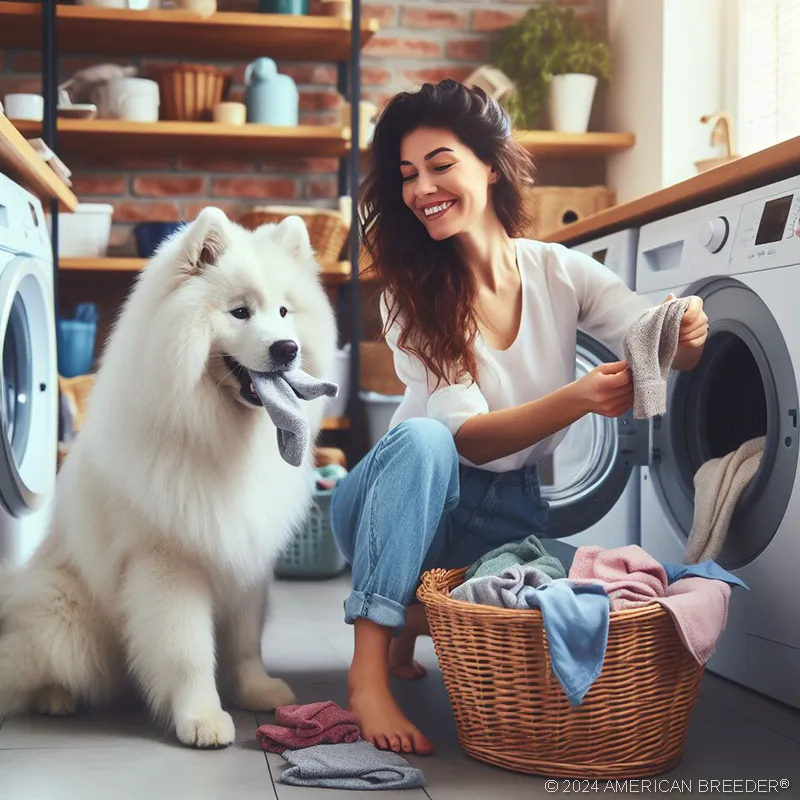 Appearance: Size: Medium-Large | Weight: Males 45-65 lbs, Females 35-50 lbs | Coat Type: Double Coat (Long Outer, Wooly Under) | Colors & Patterns: White, Cream, Biscuit | Distinctive Features: "Sammy smile," Almond Eyes, Fluffy Tail
Appearance: Size: Medium-Large | Weight: Males 45-65 lbs, Females 35-50 lbs | Coat Type: Double Coat (Long Outer, Wooly Under) | Colors & Patterns: White, Cream, Biscuit | Distinctive Features: "Sammy smile," Almond Eyes, Fluffy Tail
Temperament: Energy Level: 3/5 | Loyalty: 5/5 | Friendliness to Pets: 4/5 | Friendliness to Strangers: 4/5 | Trainability: 4/5 | Playfulness: 4/5 | Frequent Barker: 3/5 | Chase Instincts: 3/5 | Sense of Smell: 3/5 | Drive to Hunt: 2/5
Health & Care: Health Issues: Hip Dysplasia, Eye Conditions | Lifespan: 12-14 years | Grooming Difficulty: Moderate-High | Exercise Needs: Regular Exercise, Mental Stimulation
Socialization: Interaction with Children: Good | Interaction with Pets: Good (With Socialization) | Interaction with Strangers: Friendly | Elderly Compatibility: Gentle | Ease of Training: Moderate
Suitable Living Arrangements: Apartment: Not Ideal | House: Yes | Rural Area: Yes | Yard Size Requirements: Medium to Large Yard Preferred
Training & Obedience: Trainability: 3/5 | Intelligence: 4/5 | Obedience: 3/5 | Problem-Solving: 3/5 | Easily Stimulated: 4/5 | Focus Level: 3/5 | Easily Distracted: 3/5
Financial Planning: Typical Price Range: $1,000 - $2,500 | Initial Expenses: Puppy Supplies, Vaccinations | Ongoing Annual Expenses: Food, Grooming, Vet Visits
Breeding: Reproductive Maturity: 6-9 Months | Litter Frequency: 1-2 per year | Litter Size: 4-8 puppies | Stud Cost: Varies | Breeding Challenges: Grooming Demands, Health Screening
Did You Enjoy this Article? Share it and Help Us Spread the Word!
If you found this article helpful, we'd appreciate it if you could share it with your friends or link to it from your website, blog, or group! You can also use the convenient social share tabs on the left side of the screen to instantly share this page to your social media feed. For more ways to support and promote the American Breeder Community, visit our Share & Promote Together page for social media posts and memes you can copy and share. Your support means the world to us!
Disclaimer: The information provided in this article is for general informational purposes only and does not constitute legal, medical, financial, or professional advice. While we strive for accuracy, we make no representations or warranties regarding the completeness, accuracy, reliability, or suitability of the information. Please consult with a professional before making decisions based on the content provided. American Breeder Inc. assumes no responsibility for any errors or omissions or for the results obtained from the use of this information.
